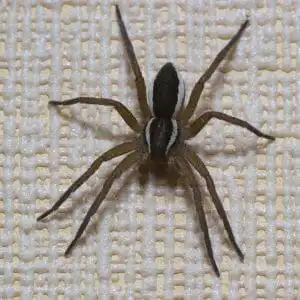Creepy. Whether we like spiders or hate them, one thing we can all agree on is that these eight-legged creatures are creepy looking. Most people don’t enjoy coming across these all-to-prevalent pests inside the house, and dislike the wispy, dusty webs they leave behind. Often, when we spot a spider, we squish it, vacuum it, or just kindly show it the door. But are spiders good or bad? Read on and find out on which side these web-spinning wonders fall.
What Are Spiders?
Spiders (Araneae), the largest order of arachnids, are eight-legged arthropods that are found almost everywhere around the world. There are more than 40,000 spider species and all have the ability to bite using fangs that inject venom. For this reason, spiders often get a bad reputation. Spider bodies have two parts–the cephalothorax and the abdomen. Their abdomens have appendages that create silky, sticky webs ranging in shape and size, depending on species. Unlike insects, spiders do not have antennae. They are predators, feeding on insects and sometimes other spiders.
Are Spiders Good or Bad?
Positives. Spiders eat many common household pests, including disease carrying insects like mosquitoes, cockroaches, and flies. In essence, they perform pest control duties for you. They also eat other spiders, therefore, reducing the creepy creature population in your home and protecting you from potentially dangerous arachnids. For example, a harmless long-legged cellar spider feeds on the dangerous black widow spider, keeping you out of harm’s reach.
Negatives. Spiders bite! The good news is they usually only bite when provoked or in self defense. Although they tend to avoid humans, these arthropods have poor eyesight so they can’t easily distinguish between a predator and an accidental encounter. Some spider bites are slightly venomous and a few species are even deadly, so no one wants to risk provoking these eight-legged creatures even if it’s unintentional.
The Usual Suspects
Most spiders fall into the categories of harmless, slightly venomous, or deadly. Thankfully, most of the ones we find in our homes are harmless. Daddy long legs and the domestic house spider fall into the harmless group.
Nearly all spider species are venomous–that is how they kill their prey. But the small doses they deliver are usually ineffective on humans and other bigger-than-a-bug beasts.
Female black widow spiders and brown recluse spiders fall into the deadly category. This is the case, though, only if you are bitten and do not seek medical attention. Easy to spot because of a red hourglass shape on their abdomens, the female black widow spider hides out in basements and wood piles and only administers a venomous bite when disturbed. Light brown in color, the brown recluse is distinguished by a violin-shaped marking on its back. It makes its home in garages, sheds, basements, and occasionally cardboard boxes.
Spider Control
If you don’t like them around, there are ways to keep the pesky spider population down to a minimum around your home.
Outdoors, keep wood piles, mulch, and vegetation from touching your home’s exterior. It’s best to store wood piles or trash away from the house. Fix or caulk any cracks or points of entry around foundations, windowsills, and doors. Most importantly, get rid of their food sources–other pests. The presence of a lot of spiders indicates that there are pests available for them to eat. Consider getting a professional to treat your home or yard.
Keep it tidy indoors. Clean up clutter and store mementos, seasonal decorations, and clothes in tightly lidded, plastic containers. If you see spider webs, be persistent about cleaning them up. Dust often, especially under and behind furniture, to prevent them from setting up shop. And get rid of piles of old boxes in your garage or attic.
Spiders naturally control pests and insects in the home. But no one wants an infestation, even if they are the harmless variety. Call Free Spray Lawn Care at 419-529-5296 and let us help you with unwanted pests.



Comments (0)
Thanks for your comment!
Thanks for your feedback! Your comments have been successfully submitted! Please note, all comments require admin approval prior to display.
Error submitting comment!
There is a problem with your comment, please see below and try again.